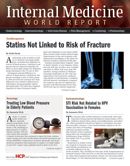Publication
Article
Internal Medicine World Report
Measles Vaccinations: Tell, Don't Ask
Author(s):
Pediatricians and primary care doctors often face a quandary when it comes to routine vaccinations for children. When talking to parents about vaccination, the best approach may be speaking to parents as though it is assumed the vaccinations will be done, rather than opening the door to parental choice.

Pediatricians and primary care doctors often face a quandary when it comes to routine vaccinations for children. When talking to parents about vaccination, the best approach may be speaking to parents as though it is assumed the vaccinations will be done, rather than opening the door to parental choice.
Writing in JAMA Pediatrics Douglas Opel, MD MPH and Saad Omer, MBBS, MPH, PhD, advise physicians to begin the discussion “with a statement regarding which vaccines the child will be getting or [is] due for” rather than asking which vaccines a parent wants.
They cite, “evidence in the fields of behavioral economics and social psychology that suggests that choice architecture can be a powerful means to achieving a desired goal.”
In other words, once a decision is made, humans have a tendency to stick with it, especially among decisions perceive to be complex. Physicians should not present vaccination as a choice, Opel and his co-author said.
“Vaccination constitutes such a decision for many parents; not only is it complicated by an overwhelming amount of information, it is also fraught with emotion,” they wrote.
Parents often find it easier to simply accept what is recommended, “Especially when that recommendation is made by someone as influential and trusted as their child’s pediatrician or family practitioner.”
Making vaccination the “default” position, rather than an “opt-in” or “opt-out” should be an effective strategy, they said.
Their piece, published in the journal’s “Outlook” section, also offers a summary of existing state policies on allowing parents to refuse to have their children vaccinated.
All states require children to have measles vaccinations to attend school, and permit medical exemptions. There are 48 states allowing religious exemptions, and 19 that permit personal belief or philosophical exemptions. The difficulty in obtaining a personal belief exemption varies. In some states, it is just a matter of checking boxes on a form. In others parents need a health care professional’s signature attesting that the parent was counseled on the risks children face when they are not vaccinated.
In places where it is easiest to get personal belief exemptions “exemptors tend to cluster” and their unvaccinated offspring may pose a threat to public health.
“Professional pediatric organizations have been—and continue to be—at the forefront of advocacy efforts to restrict exemptions,” they wrote.
Opel is with the Treuman Katz Center for Pediatric Bioethics, Seattle Children’s Research Institute in Seattle, WA.
Omer is an associate professor of global health, epidemiology, & pediatrics at Emory University, Schools of Public Health and Medicine in Atlanta, GA.






